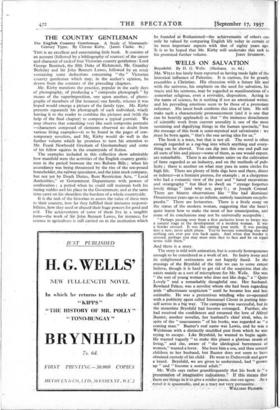,MR. WELLS has lately been reported as having made light
of the .historical influence of Palestine. It is curious, for he greatly resembles a Christian. His obsession with a future life and with the universe, his emphasis on the need for salvation, his tracts and his sermons, may be regarded as manifestations of a somewhat religious, even a revivalist, disposition. Acting in the name of science, he is nothing if not an emotional writer, and his prevailing emotions seem to be those of a protestant reformer. His latest book confirms this idea of him. He will make such a characteristic pronouncement (and it is one that can be heartily applauded) as that " the immense detachment of scientific work from current unreality is one of the most sustaining and dignifying things in the human spectacle," but the message of this book is semi-mystical and salvationist : we must be born again, " that's the one saving idea for us."
The book is a tract, but that is not all. The novel is often enough regarded as a rag-bag into which anything and every- thing can be shoved. You can dip into this one and pull out all sorts of bits and pieces—some of them, as one would expect, are remarkable. There is an elaborate satire on the cultivation of fame regarded as an industry, and on the methods of pub- licity ; there is another on what may pass in some circles fox high life. There are plenty of little digs here and there, direct or indirect—at a feminist peeress, for example ; at a clergyman who had a romantic view of the past and " hated excavations and stratigraphy " but liked to dwell on " strange forgotten lovely things " (and why not, pray ?) ; at Joseph Conrad. There are bizarre observations like " She had dismissed Omniscience years ago as an infinite, entirely inanimate encyclo- paedia." There are lecturettes. There is a lively essay on the status of the modern woman, suggesting that she hasn't quite learnt how to make the most of her emancipation, and some of its conclusions may not be universally acceptable
" Perhaps passing over from a first exclusive lover to lovers Ins a natural stage in the development of a modem woman. It was a border crossed. It was like cutting your teeth. It was passing into a new, more adult phase. You've become something else and nothing can ever put you back again. And when that border is crossed, perhaps you may- meet men face to face and be on equal terms with them.'
And there is a story.
The story is told with animation, but is scarcely homogeneous enough to be considered as a work of art. Its heavy irony and its enlightened seriousness are not happily fused. In the musings of the Brynhild of the title we can to some extent believe, though it is hard to get rid of the suspicion that . she exists mainly as a sort of microphone for Mr. Wells. She was " the sort of young woman who does not like dogs," a " Quiet Lovely " and a remarkably thoughtful one. Her husband, Rowland Palace, was a novelist whom she had been regarding with " affectionate scepticism " until he became less and less estimable. He was a pretentious windbag who co-operated with a publicity agent called Immanuel Cloote in putting him- self across in a big way. The campaign was successful, but in the meantime Brynhild had become estranged. Further, she had received the confidences and returned the love of Alfred Bunter, another novelist, her husband's chief rival, who, in spite of the " raucousness " of his books, was regarded as " a coming man" " Bunter's real name was Lewis, and he was a Welshman with a distinctly muddled past from which he was trying to escape. Like Brynhild, he wanted to begin again. He wanted vaguely " to make this planet a glorious storm of
living," and she, aware of " the ideological barrenness of women," wanted a lover. She bore him a son, and then several children to her husband, but Bunter does not seem to have obtained custody of his child. He went to Dubrovnik and grew a beard. Brynhild, we are given to understand, had " grown up " and " become a normal adult."
Mr. Wells says rather grandiloquently that his book is " a Presentation of imaginative indications." If this means that there are things in it to give a reader pause, one can agree. As a novel it is spasmodic, and as a tract not very persuasive.
• W/1.1.,Mal-PLoMER.










































 Previous page
Previous page